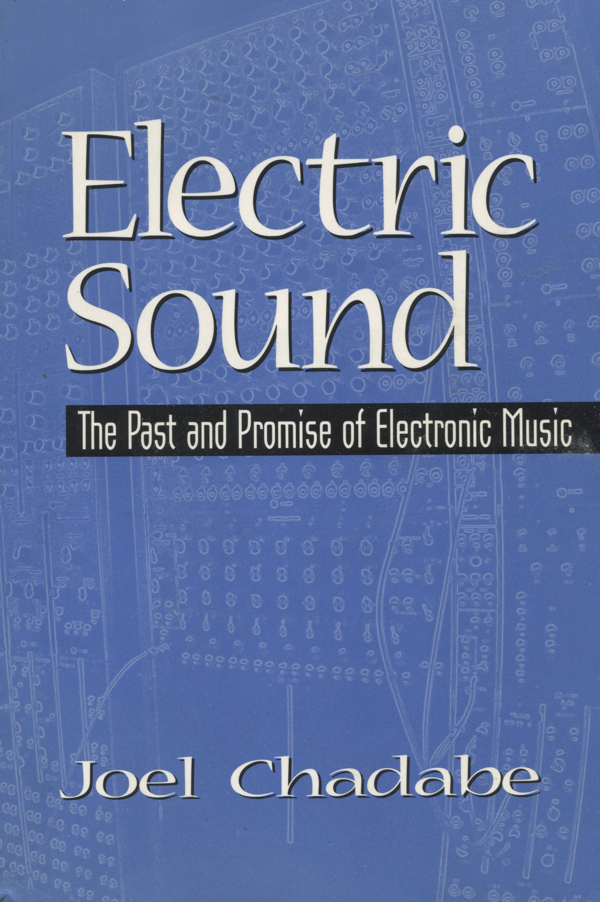



The first book to deal comprehensively with the history of electronic music, Joel Chadabe’s ‘Electric Sound: The Past and Promise of Electronic Music’ is a lively, witty, and engaging narrative that tells in vivid terms how the electronic musical instrument developed from its beginnings in Thaddeus Cahill’s Telharmonium at the turn of the century and in the theremin in the 1920s to the MIDI synthesizers of the 1990s.
Chadabe based his writing on more than 150 interviews with the musicians, engineers and entrepreneurs that developed the technology and created new approaches to music, including Robert Moog, the inventor of the first commercially successful synthesizer; Max Mathews, the inventor of digital audio; Ikutaro Kakehashi, President of Roland Corporation, who first proposed the MIDI standard; and pioneering composers such as Pierre Henry, Pauline Oliveros, Morton Subotnick, David Tudor, and many more. The book contains information never before published.
If you’re at all interested in electronic music, this book is a must. It’s an excellent introduction to the field and, at the same time, fascinating for professionals. It’s also very enjoyable. As Kyle Gann wrote, “It’s so readable, so entertainingly written, so well-researched, it reads almost like a mystery novel at times … “
Table of Contents
Preface
The pioneers in the first half of the twentieth century
1. The Early Instruments
Tape music and related technology, in the studio and in performance
2. The Great Opening Up of Music to All Sounds
3. Expansion
4. Out of the Studios
Digital technology and synthesizer concepts come together
5. Computer Music
6. Synthesizers
7. The MIDI World
Where are we in the development of performance devices and sound generators?
8. Inputs and Controllers
9. Making Sound
Ideas emerge for an interactive instrument
10. Automata
11. Interaction
Summaries and speculations . . .
12. Where are we going?
Reviews in brief
Computer Music Journal, Spring 1998. “This is a great book, for a number of reasons. First of all, it is written for the general public, so it avoids academic jargon and attitudes … And because much of the book is based on interviews with leaders in the field, it contains a wealth of information that has not previously been available anywhere else. Second, one of the most likable aspects of the book is Mr. Chadabe’s open-minded, inclusive world view … Most importantly, the book is fun …” — Warren Burt
Leonardo Music Journal, December 1997. ” … an invaluable and unique contribution to the field of electronic music in general … ‘Electric Sound’ is the work of an author who is a composer, an active contributor to the field of electronic music through his research endeavors, and a witness of his time. It marks the advent of a new era in which electronic music, in all its aspects, is becoming a part of our cultural memory. It is a book not to be missed.” — Marc Battier
Computer Music Journal, Fall 1997. ” … a fascinating historical survey of the electronic field, from the pioneers of the early 20th century to the latest developments… Ultimately, ‘Electric Sound’ is perhaps the most important text available on the history of electronic music, and is recommended reading for anyone interested in this field.” — Anna Laura Arpel
The Wire (London), July 1997. “The story this book tells has never been told at such length, nor so well as here … ” — Rob Young
Home Studio (Paris), July 1997. “Les instruments de musique electronique vous fascinent? Ne passez pas a cote de l’ouvrage de Joel Chadabe … “
Keyboard Magazine, June 1997. “It would be hard to imagine a more incisive, insightful, or purely readable history of electrical music-making … The early days of analog synthesizers are documented extensively: Not only Moog but his links with Herb Deutsch, Vladimir Ussachevsky, Eric Siday, and Paul Beaver – and not only that group but Paul Ketoff’s Synket, the Buchla/Sunotnick experiments, and much more … On the software side, Chadabe tells such stories as how Max, developed at IRCAM, was supposed to be released by his now-defunct company, Intelligent Music, but ended up at Opcode instead … He dwells on his own involvement in the electronic music scene only enough to foster the feeling that we’re reading inside information from a reliable source … ” — Jim Aikin
Mix, May 1997. “The stories of the composers, engineers, physicists and marketeers who were responsible for the electronic music medium — both their successes and failures — is fascinating. And you won’t find a better re-telling of that story than ‘Electric Sound’, by Joel Chadabe … Most impressive is how he manages to balance the technical, artistic, commercial and human aspects … Some of the anecdotes Chadabe has dug up are priceless …” — Paul D. Lehrman
Journal SEAMUS, April 1997. “This is a great book.” — Barton McLean